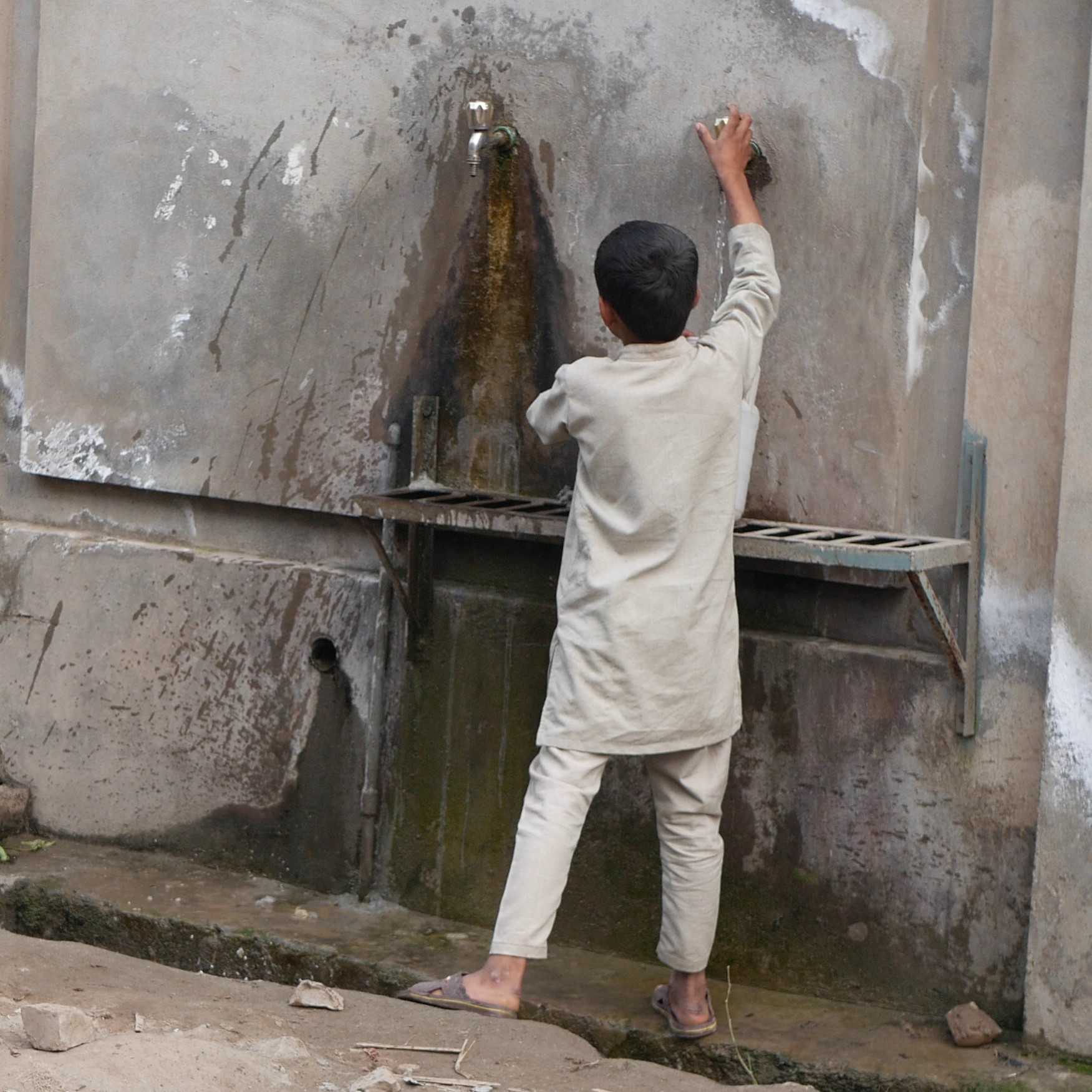Every day, 35-year-old Shah Nawaz travels three kilometres on foot to fetch drinking water for his family of 15 people. Previously, he used to get water from their village's RO (Reverse Osmosis) plant, but the plant has been out of order for the past year. This has made fetching clean drinking water an additional hardship for Shah Nawaz and the entire village.
Shah Nawaz is from the Kathoo village in Tharparkar. People here now fetch water from the storage tank of the water supply line from Nokot to Mithi. Many RO plants installed in the surrounding villages of Kathoo are also closed, and the water issue is equally severe for all these communities in Kathoo and surrounding areas.
Shah Nawaz explains that his village's RO plant worked fine for a year, but then it broke down. The villagers had it repaired with their own funds and managed to keep it running for two years. However, it has been closed since last year. Complaints were filed with the Public Health Department, but no one came to address the issue.

"Earlier, we had wells, and while the water might have been a bit bitter, everyone could access it. But when RO plants were installed, even the wells were shut down. We are facing significant difficulties. Even to fetch water for our livestock, we have to travel three kilometres. We want them to restore the wells in place of the RO plant."
The people of Thar Desert have been drinking brackish water from wells for centuries. In 2011, the Sindh government decided to install Solar Reverse Osmosis (RO) plants here to provide fresh water. The project, costing 5.4 billion rupees, aimed to supply eight hundred thousand gallons of clean water daily to the entire Tharparkar.
Under this project, the provincial government awarded a contract to a private company, 'Pak Oasis,' to install over 700 RO plants across the district. The company successfully deployed 635 plants of various sizes within three years throughout the district. After installation, the responsibility for their operation and maintenance was also entrusted to the same company.

Reverse Osmosis (RO) is a technology that reduces the concentration of dissolved solids (TDS) in water, making it suitable for drinking. In this process, water is purified by removing bacteria and heavy impurities. To achieve this, pressure and pre-RO membrane filters (a type of filter) are used.
According to public health authorities, RO plants typically not only remove dissolved salts from water but also eliminate many contaminants. For this, a complete mechanical system is set up to extract water from the ground, and a storage tank for treated water is also installed. The plant's membrane filters need to be replaced every year or year and a half.
Under the program, a RO plant with a capacity of 15,000 gallons per day was installed in the Thar region. Operators were appointed everywhere to run it. According to the Public Health Engineering (PHE) department, the annual expenditure, including the operator's salary for one plant, ranges from 20 to 22 lakh rupees.
In Mithi, the headquarters of Tharparkar, an RO plant was installed at a cost of 934 million rupees. This is the country's largest RO plant powered by solar energy, with the aim of providing 20 lakh gallons of water daily to the city and its surroundings. Former President Asif Zardari inaugurated this project in June 2015.

An official from the PHED department, on the condition of anonymity, revealed that the large RO plant in Mithi was shut down just six months after its inauguration. At the time of inauguration, only 14 out of 21 bores of this plant were operational. They operated for a year and then, one by one, they were shut down.
Sub-engineer Mohit Kumar confirms that the RO plant in Mithi is indeed closed. He explains that Mithi's population of 70,000 people requires a daily supply of six lakh gallons of water. However, now, only three lakh gallons of water are being supplied through the water supply scheme.
An officer of the Public Health Department explains that after Mithi, another large plant was installed in the city of Islamkot in the Tharparkar region. Its daily capacity is 15 lakh gallons, but it also experiences intermittent operational issues.
He says that the company "Pak Oasis," which installed all these plants, hired 760 employees in 2014 to operate these plants. The company used to get an operator's salary of 16,200 from the government treasury while they paid 10,000 per person to the employees.

According to the officer, the company used to receive 20,000 rupees per month from the government for operating the small RO plants and charged 160 rupees per thousand gallons for the water from the large plant. However, the company neglected the maintenance of the rural RO plants and did not change their membranes (filters) in the last 6 years.
The company claimed that they were providing ten million gallons of water daily from the RO plant in Mithi, and the payments were being made accordingly. In this way, the company received millions of rupees over the years.
The contract with Pak Oasis ended in 2019, and all the plants came under the supervision of the Department of Public Health Engineering.
In June 2020, a citizen named Ghulam Hussain filed a complaint on the Prime Minister's Citizen Portal regarding the lack of water supply. In response, the Chief Engineer of Public Health Engineering in Hyderabad admitted that out of a total of 635 RO plants, only 131 were operational. There were technical faults in 303 of them, and 201 plants were completely closed.

In April 2021, the RO plants in rural areas were once again contracted out. This contract was awarded to another company called "Oslo" (a joint venture between Oslo Lighting Solutions Limited and Minerva Builder and Innovation Private Limited) for one year at a cost of 1 billion 43 crores. The contract included the rehabilitation, maintenance, and operation of the plants.
The Department of Public Health Engineering had stated in a correspondence that the Oslo company was allocated the funds for 623 RO plants. The company was given 210 million for the installation of plants in Mithi and an additional 200 million for plants in Islamkot separately.
In April 2022, the contract with Oslo ended, but it was extended for three more months. However, during this time, the company neither activated any RO plant nor paid the salaries of its 760 employees for 12 months out of 15.
The supervision of RO plants is now under the jurisdiction of the Public Health Department. According to an officer, the department is working on making the plants functional again with the help of contractors. For the Mithi plant, 21 crores were allocated in the current year. But it will cost an additional 2 billion rupees to make it operational, which the department does not currently have in its budget.
Also Read

Water crisis in Ghotki: Failed filtration plants leave residents struggling with contaminated water
A local official, on the condition of anonymity, stated that the department's total budget is 50 crores, out of which 24 crores are allocated for salaries. The remaining funds will be used to activate 50 plants with difficulty, as the revival of a small plant costs between 15 to 20 lakhs rupees.
Only 100 plants are functioning across the district currently. However, Sub-Engineer Mohit Kumar claims that around 180 plants have been activated and the rehabilitation work of all the plants will be started as soon as the next budget is released.
A government officer revealed that when Public Health conducted a survey in 2022, it was discovered that only 116 plants were operational. Even among those, some required repairs. Plant operators have not received salaries for three years, and they have been staging continuous protests in front of the Mitthi Press Club.
Salah Irfan Bajeer has been employed at the RO plant since 2014 and is also the President of the Plant Operators Union. He explains that Oslo company did not spend a single rupee on the plants in one year. In the 15-month contract, only three months' salaries were paid to three hundred employees.
He says that the operators did not receive salaries for 36 months. Among them, 18 months' salaries have to be provided by the Public Health Department. When they protested, Chief Engineer Sikander Mehmood threatened them and filed several cases against them.
This representative made several attempts to raise the issue of Oslo company with the Public Health Engineering Department, including discussions with the then Executive Engineer Muhammad Al-Nabi Rafa and Chief Engineer Hyderabad, but they did not respond to his calls.
Additional Deputy Commissioner Tharparkar, Abdul Hameed Hameed Mughal, has stated that he has written to the provincial government about this issue. He hopes that the matter of employees' salaries will be resolved, and all RO plants will become operational.
Published on 10 Oct 2023




















